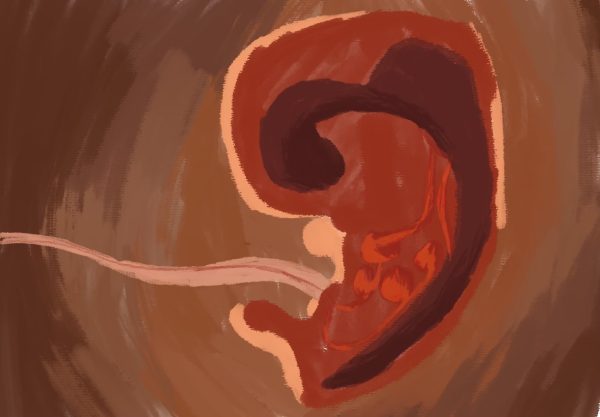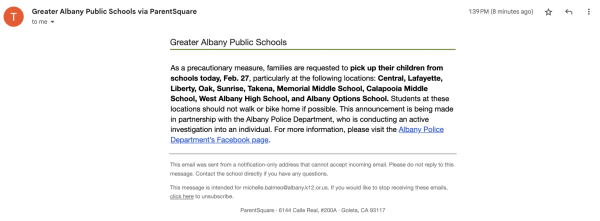Don’t Call Me that S**T!
In a high schoolers’ life they will hear various kinds of curse words. They can be used to express anger, excitement, disappointment, pain, and so much more, all depending on the context and tone of the conversation. Curse words often will range from describing an action that is usually perceived as indecent, calling somebody a horrible person, or literally meaning something like feces. But one meaning is often repeated throughout all of these words, centering down to one group: degrading and shaming women. There are many words and phrases that specifically have roots in looking down upon women. Various words focus on dehumanizing, sexualizing, and shaming women in various ways. “I obviously have experience with being called [b-word], especially by men to use it against women,” junior Noel Mayer said. “I’ve also seen it being used against family members… like my mom or my aunt, they’ve both been called the [b-word] in a derogatory way.” Even though these words’ meanings have changed over time, they are still used in a similar way: to demean and look down on women. Even if the person doesn’t identify as a woman, these derogatory words are still thrown at people who look feminine, or even to shame masculine people. “I dress the way I dress, so a lot of the time slurs are thrown at me. I get called the s-slur for women a lot,” junior Maeryn Fisk said. Fisk often dresses up in a goth clothing style, causing them to receive a lot of unwanted negative attention. “Just walking by random people, usually men or by little boys, especially in the gym,” they said. They can also be used to attempt and show dominance over women. “Sometimes it’s just by someone who’s trying to exert power over someone, like a significant other,” Mayer said. Based on the ways these words have been used to hurt and shame, should they be considered as slurs, or as something else? “I think slurs are a little silly in general because it just gives more power to the word,” Fisk said. “But to not call it a slur gives more power to the people. I would rather give the word more power than the people.” Mayer feels that the word doesn’t need to be labeled as a slur; instead, she feels people should consider what they are saying before they do say it. “I don’t think that people should be saying [slurs] as frequently as they do, and I don’t think it should be used against someone,” Mayer said. “People should think more about what they’re saying.” Although many of these words are associated with a negative tone, many women and feminine presenting people have reclaimed them, to become a playful or endearing method of addressing friends. “I think it’s hilarious to call my friends some of the different words. It’s just a fun way to make these words my own,” said Junior Lucy Rouse. These words have ingrained themselves into the English vocabulary, and it is near impossible to get rid of them. However, we can educate ourselves on the meanings behind them and realize the harmful effects they have had on others, and in turn, hopefully stop the derogatory use of these words.
In a high schoolers’ life they will hear various kinds of curse words. They can be used to express anger, excitement, disappointment, pain, and so much more, all depending on the context and tone of the conversation.
Curse words often will range from describing an action that is usually perceived as indecent, calling somebody a horrible person, or literally meaning something like feces. But one meaning is often repeated throughout all of these words, centering down to one group: degrading and shaming women.
There are many words and phrases that specifically have roots in looking down upon women. Various words focus on dehumanizing, sexualizing, and shaming women in various ways.
“I obviously have experience with being called [b-word], especially by men to use it against women,” junior Noel Mayer said. “I’ve also seen it being used against family members… like my mom or my aunt, they’ve both been called the [b-word] in a derogatory way.”
Even though these words’ meanings have changed over time, they are still used in a similar way: to demean and look down on women. Even if the person doesn’t identify as a woman, these derogatory words are still thrown at people who look feminine, or even to shame masculine people.
“I dress the way I dress, so a lot of the time slurs are thrown at me. I get called the s-slur for women a lot,” junior Maeryn Fisk said. Fisk often dresses up in a goth clothing style, causing them to receive a lot of unwanted negative attention.
“Just walking by random people, usually men or by little boys, especially in the gym,” they said.
They can also be used to attempt and show dominance over women. “Sometimes it’s just by someone who’s trying to exert power over someone, like a significant other,” Mayer said.
Based on the ways these words have been used to hurt and shame, should they be considered as slurs, or as something else?
“I think slurs are a little silly in general because it just gives more power to the word,” Fisk said. “But to not call it a slur gives more power to the people. I would rather give the word more power than the people.”
Mayer feels that the word doesn’t need to be labeled as a slur; instead, she feels people should consider what they are saying before they do say it. “I don’t think that people should be saying [slurs] as frequently as they do, and I don’t think it should be used against someone,” Mayer said. “People should think more about what they’re saying.”
Although many of these words are associated with a negative tone, many women and feminine presenting people have reclaimed them, to become a playful or endearing method of addressing friends. “I think it’s hilarious to call my friends some of the different words. It’s just a fun way to make these words my own,” said Junior Lucy Rouse.
These words have ingrained themselves into the English vocabulary, and it is near impossible to get rid of them. However, we can educate ourselves on the meanings behind them and realize the harmful effects they have had on others, and in turn, hopefully stop the derogatory use of these words.
Your donation will support the student journalists of West Albany High School. Your contribution will allow us to purchase equipment and cover our annual website hosting costs.
so true!!!!









